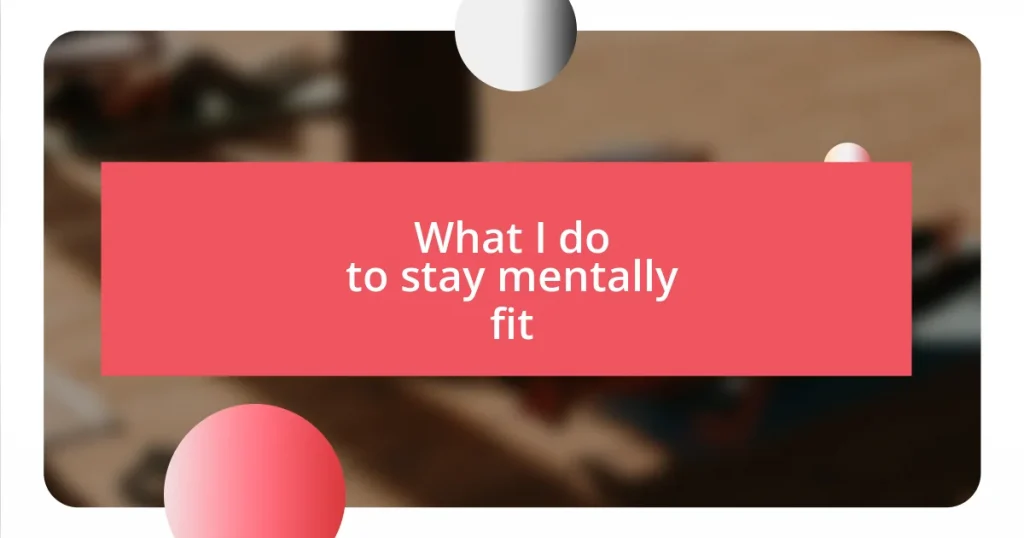Key takeaways:
- Mental fitness involves daily practices like gratitude journaling, mindfulness, and stress management techniques such as deep breathing and meditation.
- Physical activity, whether through dance, yoga, or brisk walks, significantly enhances mental clarity and emotional well-being.
- Building a supportive social network and prioritizing sleep and nutrition are essential components for maintaining mental fitness and resilience against stress.
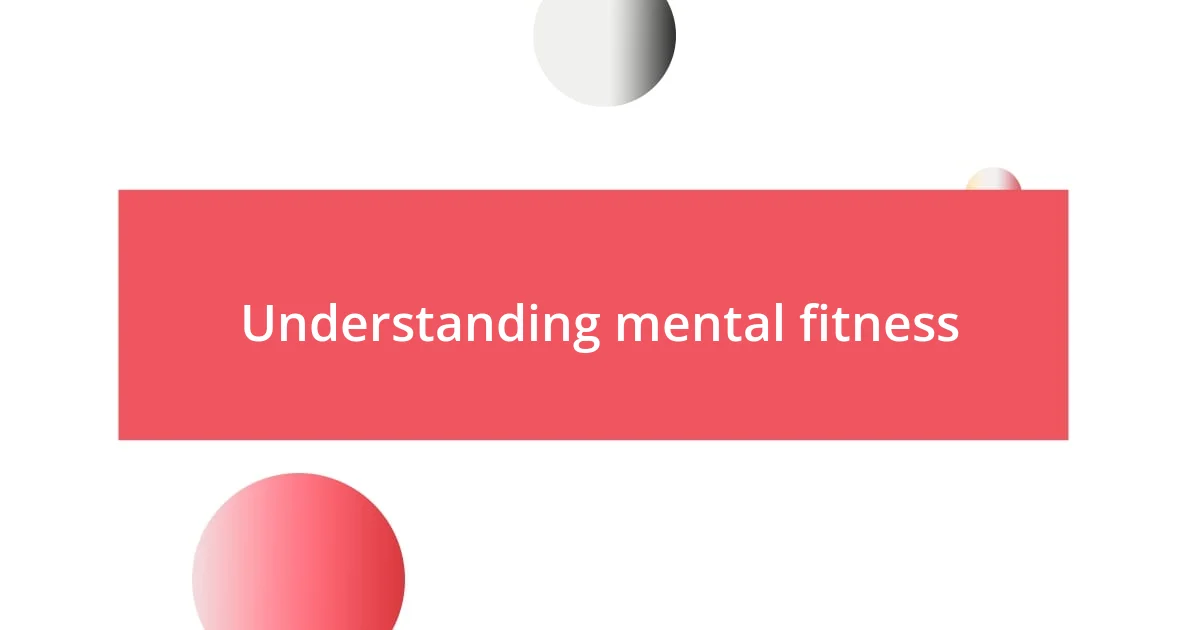
Understanding mental fitness
Mental fitness is all about maintaining a healthy state of mind, much like how we work out to keep our bodies fit. I often think about my own mental fitness as a daily practice, rather than a one-time goal. It requires consistent effort and awareness; have you taken a moment today to check in with your feelings?
For me, mental fitness means being attuned to my emotions and managing stress effectively. I remember a particularly hectic week at work when I started feeling overwhelmed. Rather than powering through, I took short breaks to breathe and meditate, which helped me regain my focus and calm. It’s incredible how a few moments of stillness can change our perspective.
Engaging in activities that challenge the mind is also crucial for staying mentally fit. Personally, I’ve found that puzzles and reading not only entertain me but keep my brain sharp. What activities do you find stimulate your mind? It’s essential to discover what works for you, as enhancing mental fitness is a personalized journey.
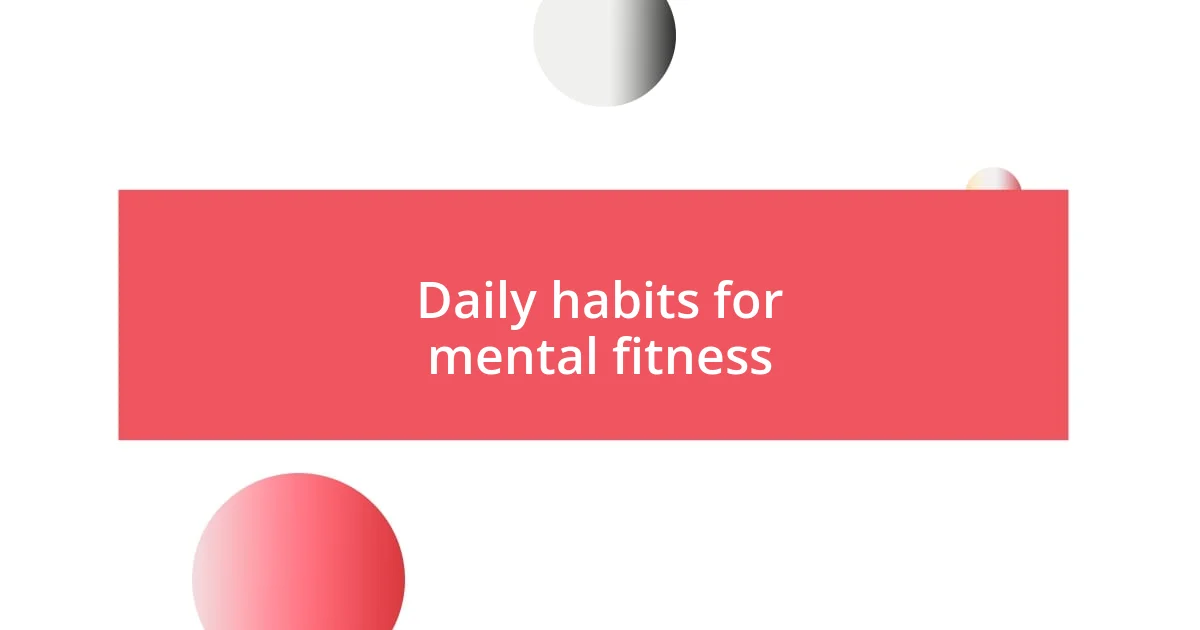
Daily habits for mental fitness
Fostering daily habits is key to nurturing mental fitness. One of my favorite routines is starting each morning with a few moments of gratitude. I keep a journal by my bed, and each day, I jot down three things I’m thankful for. This simple act shifts my mindset and sets a positive tone for the day. When I’m feeling particularly stressed, I remember those moments of gratitude and feel more grounded.
Here are some daily habits that might help you enhance your mental fitness:
- Mindful Breathing: Spend a few minutes focusing on your breath to reduce anxiety.
- Physical Activity: A brisk walk or light exercise can boost your mood significantly.
- Digital Detox: Set aside time each day to unplug from devices and cultivate presence.
- Healthy Eating: Nourishing my body with whole foods has a visible impact on my mental clarity.
- Social Connections: Reaching out to friends or loved ones, even through a quick message, reinforces that sense of belonging.
One time, after a particularly long week, I decided to implement these small changes. I felt lighter and more engaged with the world around me. It’s fascinating how these little adjustments can create a ripple effect on our mental clarity and overall well-being.
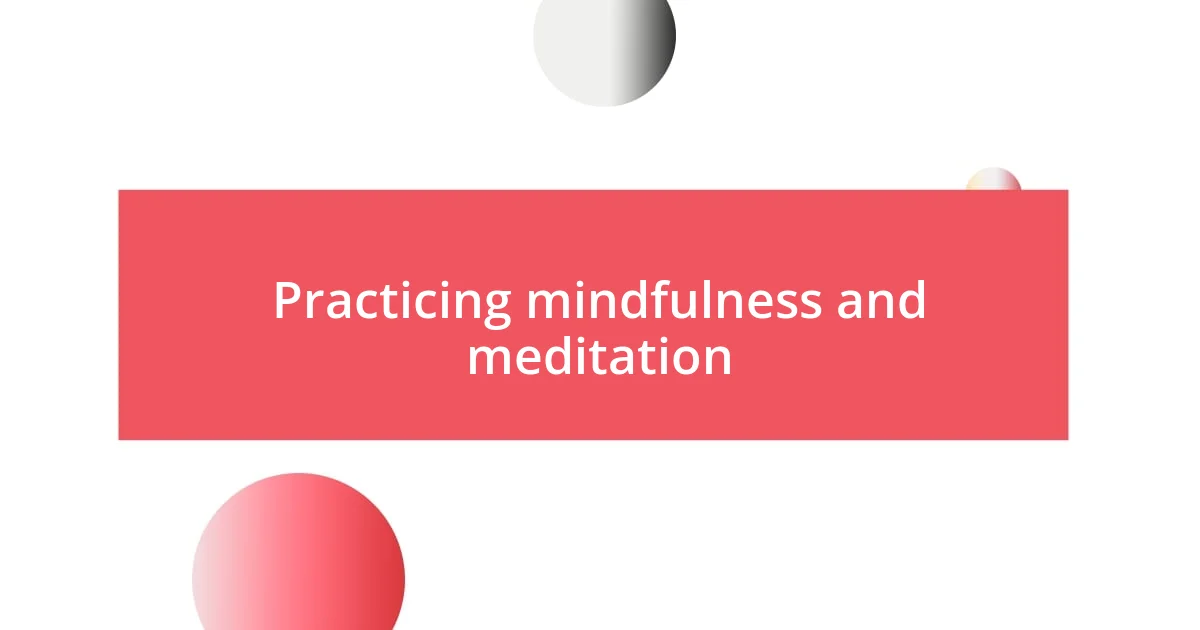
Practicing mindfulness and meditation
Practicing mindfulness and meditation has transformed my approach to everyday challenges. Whenever I feel waves of anxiety creeping in, I turn to a simple meditation practice. Just sitting quietly for five to ten minutes, focusing on my breath, allows me to center my thoughts. It’s amazing how this brief pause creates space for clarity in my mind.
I vividly remember a moment when I was caught in a whirlwind of deadlines and responsibilities. I felt my mind racing and knew I needed to find stability. I took a break and stepped outside, closing my eyes while taking deep, deliberate breaths. The fresh air and the sounds of nature helped me ground myself, and with each inhale, I felt the tension slowly melt away. Such moments remind me of the power mindfulness holds—it truly can transform our day.
In my experience, incorporating mindfulness into daily routines brings profound benefits. I’ve started practicing mindful walking during my evening jogs, focusing on each step and the sensations in my feet. This practice not only enhances my connection to the present moment but also elevates my physical workouts. Have you ever tried to focus solely on your surroundings while exercising? I find that it enriches the experience and promotes peace amidst a busy, sometimes chaotic life.
| Aspect | Mindfulness | Meditation |
|---|---|---|
| Definition | A practice of being present and aware of your thoughts and feelings | A structured practice that often involves focusing on breathing or a mantra |
| Duration | Can be practiced in brief moments throughout the day | Typically involves longer, dedicated time periods |
| Goal | Enhancing awareness and appreciation of the present moment | Fostering deep relaxation and mental clarity |
| Practical Example | Noticing the taste of your food while eating | Sitting quietly and focusing solely on breathing for ten minutes |
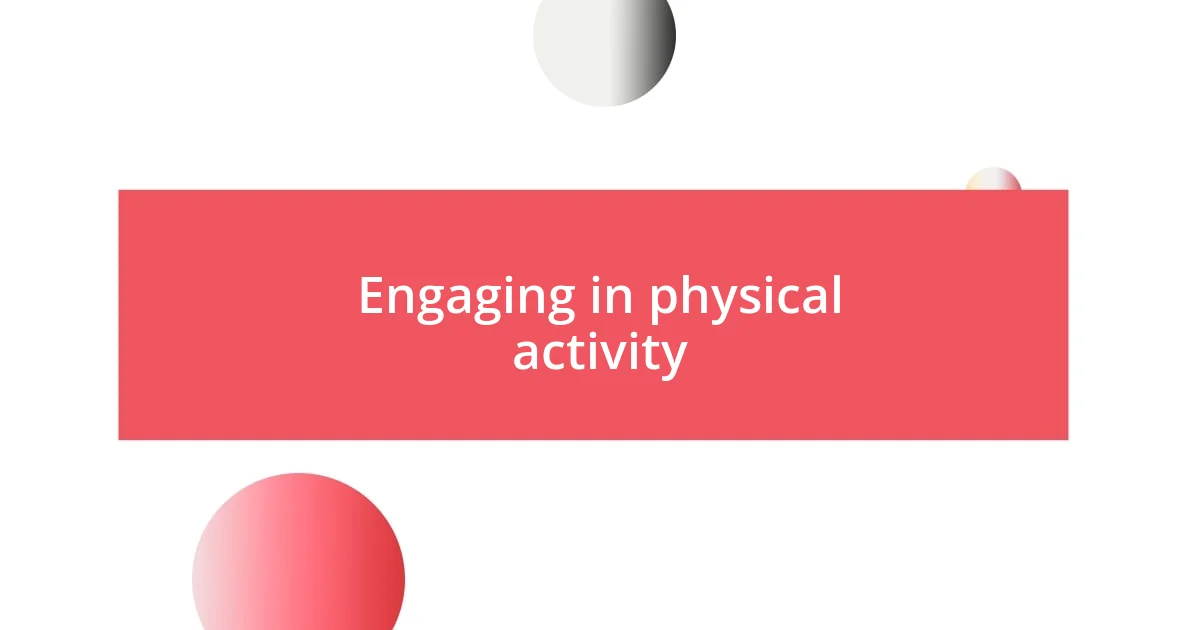
Engaging in physical activity
Engaging in physical activity has always been a grounding force in my life. I’ve found that incorporating even a short walk into my daily routine lifts my spirits and sparks my creativity. Whenever I feel my energy waning, stepping outside for fresh air instantly rejuvenates me. Isn’t it interesting how a simple change of scenery can shift our mental state so dramatically?
One of my favorite ways to stay active is through dance. I remember a time when I put on my favorite playlist and just let loose in my living room. It felt liberating, almost like I rediscovered a piece of myself that had been overshadowed by daily stresses. Through those moments, I realized that physical activity doesn’t have to be structured or daunting; it can simply be about moving my body and enjoying the rhythm. How does dancing make you feel?
Lately, I’ve also embraced yoga, which beautifully blends physical movement with mindfulness. During a challenging session, I often find myself connecting deeply with my breath and body. I recall one practice where I felt all my worries melt away with each pose I held. It’s fascinating how the combination of physical strength and mental focus can lead to such clarity. Engaging in physical activity, in whatever form, truly nurtures my mental fitness, creating a healthy balance in my life.

Building a supportive social network
Building a supportive social network is essential for maintaining mental fitness. Personally, I find that surrounding myself with positive, encouraging friends can make all the difference when I’m feeling low. There was a time when I was working through a challenging project—a friend reached out just when I needed to talk, and that simple gesture reminded me of the power of human connection.
I’ve also seen firsthand how group activities foster this network. Joining a local book club opened my eyes to not just new perspectives on literature, but also to the friendships that blossomed through shared discussions. Have you ever experienced that moment when a conversation just clicks, and suddenly you’re bonded over a mutual interest? It reinforces the idea that a supportive community can lift our spirits and motivate us to keep pushing forward.
I’ve learned to nurture these relationships consciously. Regularly checking in with friends, whether through simple texts or coffee catch-ups, helps strengthen those connections. Reflecting on these moments, it’s clear to me that investing time in our social circles can act as a buffer against life’s stresses. How do you prioritize your friendships? For me, it’s all about the little things that keep those connections vibrant and relevant.
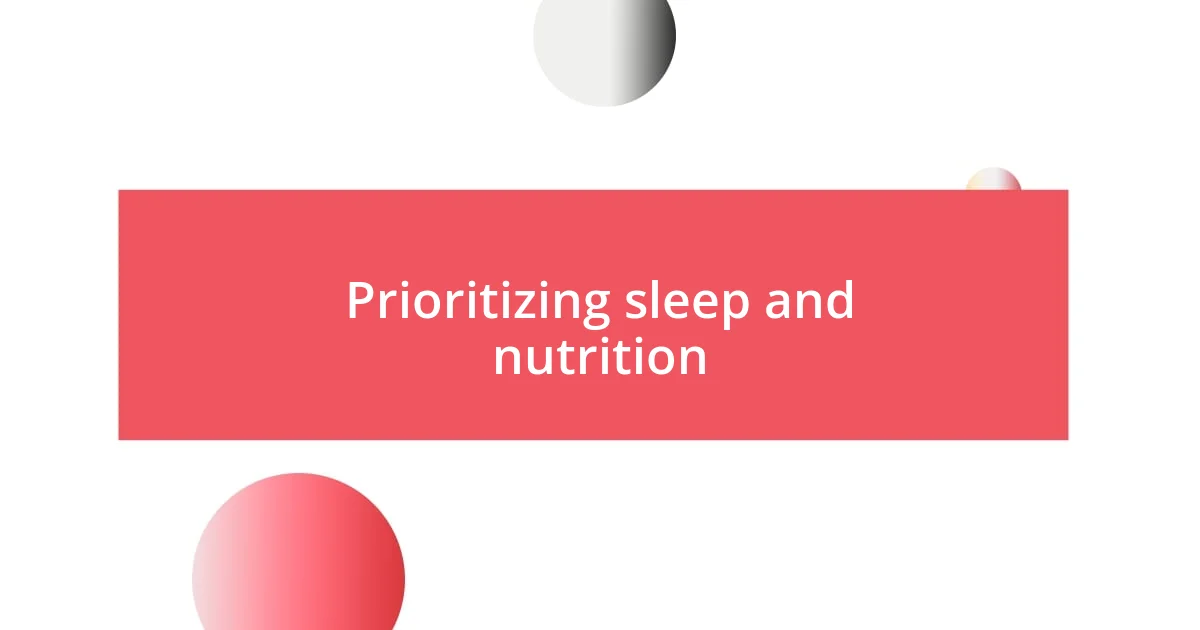
Prioritizing sleep and nutrition
Prioritizing sleep and nutrition
I can’t stress enough how critical sleep and nutrition are to my mental wellness. I’ve discovered that a good night’s sleep can be as rejuvenating as a mini-vacation. There have been nights when I skimped on sleep, and the next day felt like wading through mud—imagine trying to think clearly when your mind feels foggy. Have you experienced that? It’s a direct reminder that prioritizing sleep is not just a luxury; it’s a necessity for mental clarity.
Nutrition plays an equally important role in my mental fitness. I recall a time when my diet was erratic, fueled by caffeine and quick snacks. It didn’t take long before I noticed my mood swings became more pronounced and my focus dwindled. Since then, I’ve made a conscious effort to include more whole foods—like fruits, vegetables, and lean proteins—in my meals. There’s something incredibly satisfying about preparing a vibrant salad or a hearty grain bowl that nourishes not just my body, but also my mind.
On days when I plan meals mindfully and ensure I get enough rest, I feel like I’m on top of the world. It’s fascinating how my mood tends to shift dramatically with these changes. I find myself more engaged and ready to tackle challenges head-on. Moreover, I often question how my dietary choices inform my emotional landscape. What if the foods we consume are not just fuel but also a reflection of our mental state? For me, this journey has revealed the deep connection between what I eat, how I sleep, and how I navigate daily life. It’s a cycle worth cultivating for anyone looking to enhance their mental fitness.
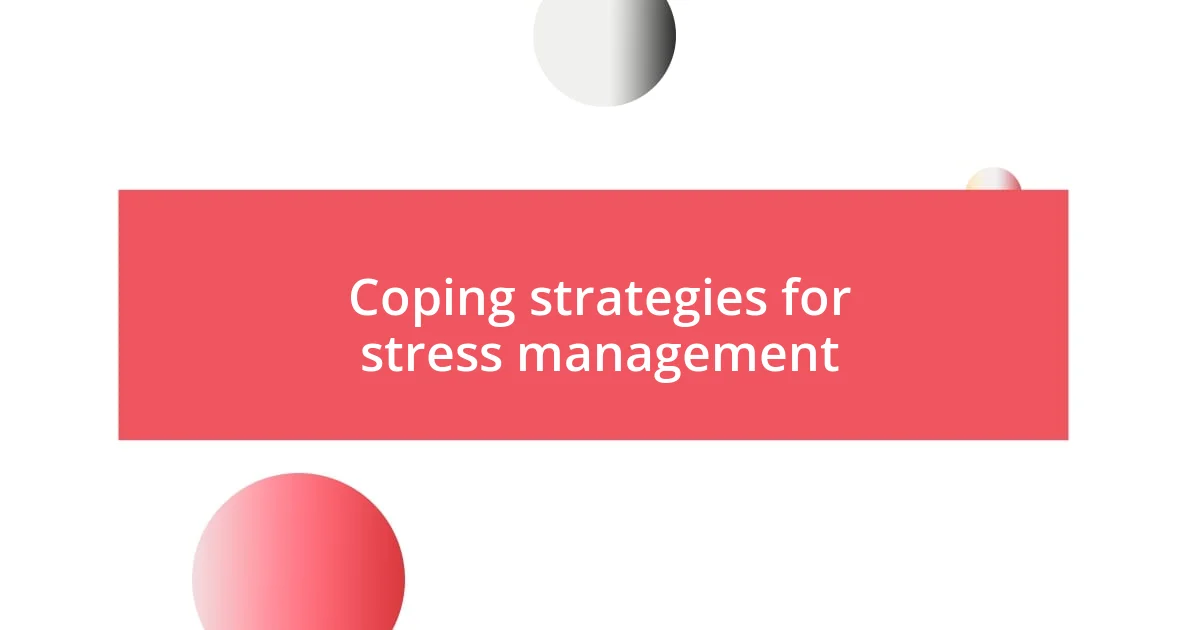
Coping strategies for stress management

Coping strategies for stress management
When stress hits, I’ve found that having a go-to coping strategy is essential. One technique that has worked wonders for me is deep breathing. I remember a time during a particularly hectic week when I took just five minutes to focus on my breath. It felt as if the world slowed down, allowing me to reset and tackle my tasks with clarity. Have you ever tried something so simple yet so effective? It’s amazing how grounding ourselves can create a bubble of calm amidst chaos.
Another strategy that I swear by is practicing mindfulness. I wasn’t always convinced of its benefits, but a friend introduced me to meditation, and I reluctantly gave it a try. The first few sessions were challenging, yet over time, I discovered a space within me that feels more resilient when faced with stressors. Sometimes, I just sit in silence, observing my thoughts without judgment. It makes me wonder—could this be the key to unlocking a healthier response to the pressures we face daily? For me, embracing mindfulness has transformed how I handle stress.
Lastly, I pay close attention to my physical activity. Whether it’s a brisk walk around the block or a dance session in my living room, moving my body releases pent-up tension. There was a period when I felt overwhelmed, and, without fail, a quick workout would lighten my mood and sharpen my focus. Isn’t it fascinating how something as simple as movement can act like a reset button for our mental state? It’s become clear that engaging in physical activity is not just about staying fit; it’s also about nurturing my mental resilience in the face of stress.










